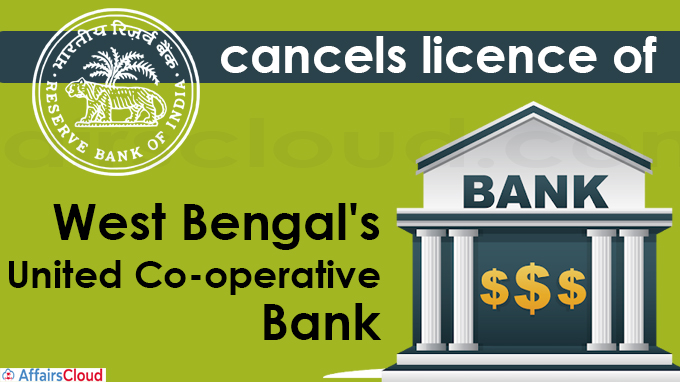 The Reserve Bank of India (RBI) has cancelled the license of United Co-operative Bank Ltd., Bagnan, West Bengal in May 2021, as the bank does not have adequate capital and earning prospects to pay its present depositors in full.
The Reserve Bank of India (RBI) has cancelled the license of United Co-operative Bank Ltd., Bagnan, West Bengal in May 2021, as the bank does not have adequate capital and earning prospects to pay its present depositors in full.
- The bank also does not comply with the provisions of section 11(1) and section 22 (3) (d) read with section 56 of the Banking Regulation Act, 1949.
- The bank has failed to comply with the requirements of section 22 (3) (a), 22 (3) (b), 22 (3) (c), 22 (3) (d) and 22 (3) (e) read with section 56 of the Banking Regulation Act, 1949.
- Following the cancellation of the licence, the bank is prohibited from conducting the ‘banking’ business (including acceptance of deposits and repayment of deposits) (From May 13, 2021) as defined in Section 56 of the Banking Regulation Act, 1949.
Paying back the depositors (Under DICGC Act, 1961):
i.All the depositors of the United Co-operative Bank Ltd. will receive the full amounts of their deposits from Deposit Insurance and Credit Guarantee Corporation (DICGC).
ii.After Liquidation, every depositor would receive a deposit insurance claim amount of his/her deposits up to a monetary ceiling of Rs 5 lakh from the DICGC (as per the provisions of the DICGC Act, 1961).
What is Liquidation?
It is the process of converting a company’s assets into cash and using those funds to repay, the company’s debts as much as possible.
Recent Related News:
RBI has cancelled the license of Bhagyodaya Friends Urban Co-operative Bank Limited, Maharashtra in April 2021, as the bank doesn’t have adequate capital to fund its depositors in full and as it did not comply with the various provisions of the Banking Regulation Act, 1949.
About Reserve Bank of India(RBI):
- RBI was established in 1935 and nationalised in 1949
- The 1st headquarters of RBI was located in Kolkata
- The cash reserve Ratio (CRR) is the amount of funds that the banks have to keep with the RBI
- Reverse Repo rate is the rate at which the RBI borrows money from commercial banks
- Repo rate is the rate at which the RBI lends money to commercial banks




